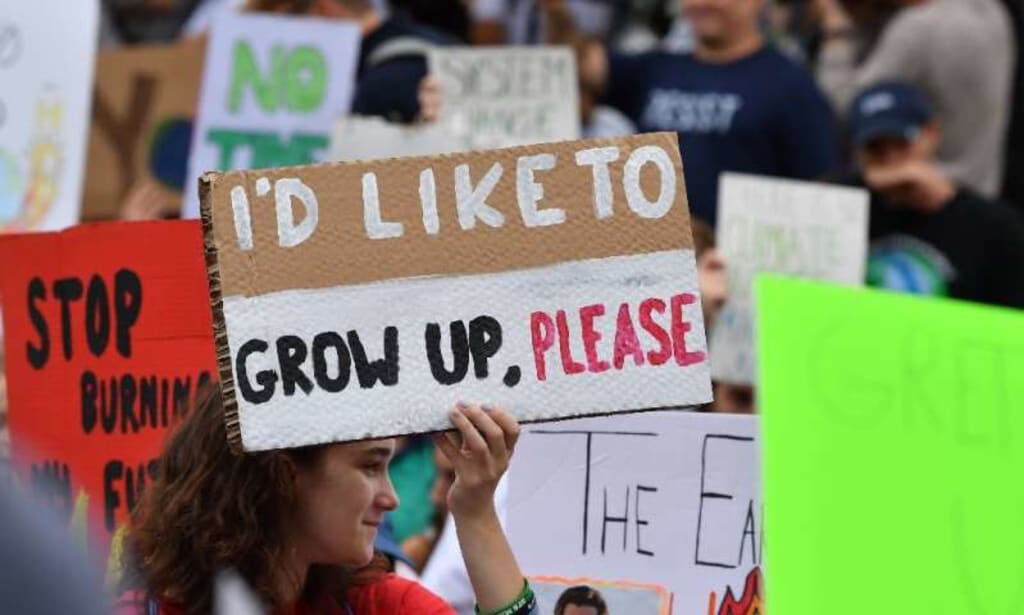Science Journalists Are Not Doing Enough to Inform the Public About Climate Change
The writing is on the wall about climate change and science communicators and journalists are not doing enough to inform the public of how dire the situation is.

It's a sweltering hot July day and I'm sat in a small room on the campus of Ecole polytechnique fédérale de Lausanne (EPFL), Switzerland with about 50 science journalists and communicators. We've all gathered for the preliminary workshops of the World Conference of Science Journalists 2019.
It's both my first time attending the conference and experiencing Summer in Geneva —which is being battered by a heatwave that has just passed through France, a heatwave that went on to claim 567 lives, and set record temperatures in Germany, Belgium, Luxembourg, and the Netherlands.
Barring the heat, the day has been cordial and quite enjoyable thus far. That is definitely about to change.
The session we are supposed to be about to experience is one on countering misinformation in the media, but from the instant that I lock eyes with the first speaker —a climatologist from the UK —I realise that the cordial atmosphere is about to dissolve.
He starts his talk by jabbing an angry finger at the entire room. "You," he begins "are not doing enough." Over the next 15 or so minutes, we hear this scientist's feelings on how the media reports climate change, and he is it not happy. Not happy at all.
But he most certainly isn't the antagonist of this story. He and his colleagues are the protagonists. They're absolutely right. The media isn't doing enough to accurately report the severity of climate change. And science journalists need to rectify this immediately.
Our climatologist argues that when the media does pay attention to climate change we don't report the harshest models, the most extreme predictions, because we don't want to 'scare' the public or 'turn them off' from the subject. But by doing this we are doing them a disservice.
The public should hear the more extreme models, the problem is, from my perspective, that the public is generally not science-literate enough to understand what a 'model' in science is.
Much like the way creationists in the past have slandered evolution by mixing the scientific definition of the term 'theory' with its common parlance interpret —which generally means a guess or a hunch — the word 'model' doesn't convey the robustness of science adequately.
This problem is compounded when we consider that there isn't just one or two competing models of climate change —to people familiar with science there is an understanding that this is pretty common. But, to the general public, competing models and predictions are often considered indicative of the idea that scientists can't agree on climate change.
And there are agents of disinformation that are more than willing to exploit this fundamental misunderstanding. 'Climate skeptics'— or 'climate deniers' as I believe is more fitting— will tell the public that the fact that these differing models exist suggest that the science behind climate change 'isn't settled'.
Of course, this ignores the fact that science is rarely 'settled'. Predictions are improved, made more precise, new factors are discovered and incorporated into models —which are ostensibly the replacement for theories in the modern age of science.
The tactics used by the anti-climate change lobby are exactly the same as those used by the tobacco lobby to deny the connection between smoking and lung cancer. The same tactics were then adapted to attempt to disparage the connection between coal and acid rain, and later, CFCs and the hole in the ozone layer.
In other words, these lies and manipulations have been employed now for four decades, which leads to the question, why the hell is the media so bad at dealing with them?
The media doesn't understand bias when it comes to science
I consider myself part of the 'media'. Sure I write for small independent sites and platforms like Medium and Vocal — but I'm still part of this massive journalistic machine, and I've seen it from the inside.
One thing that you're quickly taught in officially structured journalism courses is that bias is the enemy of good journalism. So in community journalism, if you're speaking to protesters who oppose the destruction of local green belt, you also go out and find local councilors or business owners who can point out the positives of a new motorway junction or retail park.
But the media isn't great at transferring the idea of balance to the communication of science. Let's say you're working for the BBC, and your first task is booking guests to discuss the latest findings on climate change from Exeter University. You book the researcher in charge of the study, or the first author of the paper detailing its findings —often not the same person —but for balance you need someone to sit across the table and disagree with these findings. So you go out looking for a public speaker who denies the scientific consensus of climate change. And there are plenty of such individuals out there.
In fact, you may not even have to reach out to them. Many organisations that oppose accurate reporting of climate change actively lobby television stations to get representatives onscreen if they get wind of an upcoming report.
Often, what results is a bloodbath. Scientists are great, but they aren't always the best at presenting their work to the public. Put them against somebody with excellent rhetoric and they can struggle. Couple this with the fact that science is highly specialised. This means that prominent anti-climate change advocates can control the narrative by understanding what is, and crucially, what isn't the scientist's field.
Case in point: On Australian TV program Sunrise in 2009 one of the world's most active climate deniers Lord Christopher Monckton debated climate scientist Ben O'Neil. The debate did not go well for O'Neil who had simply underestimated Monckton's ability to rattle off a speil of 'evidence' to support his case.
The thing about debating science is to counter a claim made in error, like everything Monckton said in this case, takes time and research. It can't be done on the fly. So Monckton's well-rehearsed rubbish looked more convincing.
Laughably, Monckton also poked holes in O'Neil's qualifications— pointing out what he was and wasn't qualified to talk about. A tactic which is admirable in its sheer brazenness when we consider that Monckton has no scientific qualifications, and therefore by his own standards, shouldn't be talking about climate change at all. You can watch science journalist and YouTuber Potholer54's brilliant takedown of Monckton's appearance here.
By platforming climate denialists, media organisations are not presenting balance. If 95 percent of the scientific community agree on climate change and the fact that it is driven by humanities' activities, a climate change denialist is not the legitimate opposition.
That doesn't mean that media organisations can't present science stories with balance. But, in the case of a new model balance if a researcher or scientist who is independent of the research commenting — they may not necessarily even disagree with the findings. Balance doesn't have to be artificial opposition.
Unlike feuds over greenbelts or governmental policy, science isn't founded on opinion. That means that balance in science reporting may not look the same as balance in other subjects.
The majority of people working in the media are humanities graduates, and there's absolutely nothing intrinsically wrong with that, but it means that many news outlets aren't adequately equipped to report science. That means, in turn, they aren't adequately set up to report on climate change —arguably the most important news story facing mankind.
During my very brief time on a local newsdesk, my editor's position on science journalism was clear, there was no need for the paper to have a science correspondent —their readers, I was told, just aren't interested in science.
That's the uphill struggle facing science communicators. We have to make readers care, and we have to make editors and publishers know that they care.
Is the tide turning, and is it too late?
September 20, 2019 saw a remarkable and positive event in the history of climate change action. Millions of people took to the streets to protest against world governments' approach to climate change. The majority of these protesters were young people, striking from school and college to show those in power that they are desperately concerned about the world that we— their parents and grandparents—are leaving for them.
Inspired by the example of Greta Thunberg —a sixteen-year-old Swedish environmental activist who is holding politicians to account for their lack of action on the climate crisis—these children and young people demand that our leaders take action.
I'm both amazingly proud of these young people and ashamed that my generation didn't do more. I'm also ashamed of my peers who poured scorn on the protests on social media.
These young people aren't lazy and shallow, mobile devise-addicted, science illiterate idiots — their critics are.
Even education secretary Gavin Williamson was critical, saying that "every child" should be in school. "They should be learning, they shouldn't be bunking off, and it's very irresponsible for people to encourage children to do so."
They have 'learned' you shallow idiot. They have listened to their science teachers. They've learned how the scientific enterprise works. They understand the science better than most adults.
We need to learn from them, not vise versa!
So what, if anything, can science communicators learn from the protests held worldwide on September 20?
We need to do more. We need to be bolder. We need to call-out climate denial bullshit when we come across it. We need to work harder on exposing the tricks used by the climate change lobby to deceive the public. We need to stay abreast of developments in climate science — even if that isn't our beat.
And finally —we can't shy away from more extreme and frightening models, because they may 'scare' the public —you don't avoid screaming to a cyclist that they are heading for a cliff-edge in fear of giving them a fright.
And whether we like it or not, that is where we are at now.
About the Creator
Robert Lea
Freelance science writer/journalist. Space. Physics. Astronomy. Quantum physics. Member of the ABSW. Follow me at https://twitter.com/sciencef1rst






Comments
There are no comments for this story
Be the first to respond and start the conversation.